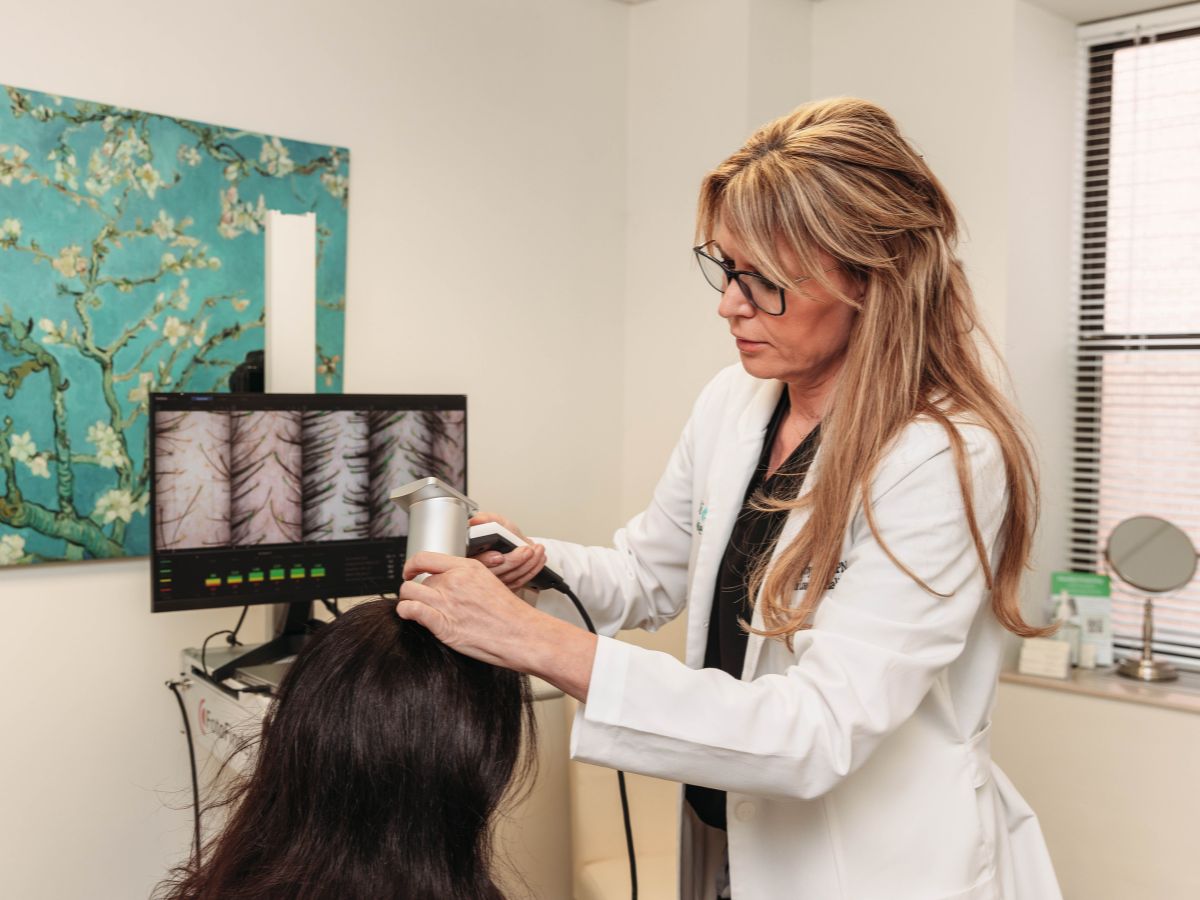
While hormone replacement therapy (HRT) offers relief for many symptoms in women, most commonly menopause, it can inadvertently contribute to hair thinning or shedding – particularly in the presence of dramatic hormonal balance shifts. Ironically, the hormones used in HRT that are meant to regain balance can result in a frustrating side effect: hair loss.
Fortunately, there are many effective treatments available for those who are on HRT and who are experiencing menopause-related female pattern hair loss. Today we will explore HRT effects on hair and what can be done about hormonal hair loss.
First off, what is hormone replacement therapy, or HRT? This is a medical treatment designed to increase hormone levels that are naturally produced in smaller amounts as people age. HRT is typically prescribed to manage menopausal symptoms, such as hot flashes, night sweats, and vaginal dryness.
It’s important to note that not everyone on HRT will experience changes in their hair. In fact, while some people report hair loss as a side effect, others experience an improvement in their hair health. HRT can have varying effects depending on the type of medication used, whether estrogen-, progesterone- or testosterone-based HRT.
Those who do experience HRT-related hair loss find that it often starts slowly, with thinning around the crown and part. The amount of hair loss or thinning varies by person, and it can take several months to see HRT effects on hair.
More and more women are prescribe testosterone, which is great for the relief of menopause symptoms, but not so great for hair. While testosterone itself doesn't directly cause hair loss, it can contribute to increased production of dihydrotestosterone (DHT). This then binds to hair follicles and weakens them, potentially resulting in hair loss.
In other words, with genetic-based hair loss, testosterone itself isn’t the problem; it’s the DHT that is release from testosterone that can affect the hair follicles. Higher levels of testosterone bring higher levels of DHT. Similar to women on birth control, that can have an effect on hair growth depending on how the hormones are replace.
As women age, their hormones naturally decrease; however, testosterone decreases less than estrogen and progesterone. Because the percentage of testosterone is greater over time, women can be more susceptible to hair loss as they age.
The connection between HRT and hair growth is complex. There are many factors that contribute to this delicate balance, such as genetic predisposition, hormone types used, and individual sensitivity to hormonal fluctuations. As said above, not all women experience hair loss with HRT; some experience a boost in hair texture, thickness, and growth rate.
Some factors to consider include:
Only a hair loss specialist can explore these nuances that exist for each individual to come up with an effective treatment regimen that addresses hair loss or thinning due to HRT.
We never recommend patients concerned about hair loss utilize testosterone due to the effects on the hair. If they are on testosterone, we need to check their labs to see what their levels are and often recommend they stop it, especially if their levels are significantly higher than what we recommend for hair.
Many treatments can address hormone-related hair loss, particularly in women undergoing hormone replacement therapy (HRT). These treatments are designed to counteract the effects of hormonal fluctuations, including increased DHT levels that can trigger hair thinning and shedding.
Every woman is different, and not every treatment will work for everyone. That’s why it’s so important to get personalize recommendations by a hair loss specialist in Boston and surrounding areas to determine the most suitable treatment plan. Once they determine your specific condition during a one-on-one consultation, they can recommend the most effective treatment to manage HRT-related hair loss.
If you suspect you are experiencing hair loss due to hormone replacement therapy, we can help. Start with a personalized consultation when you call Medi Tresse today.


